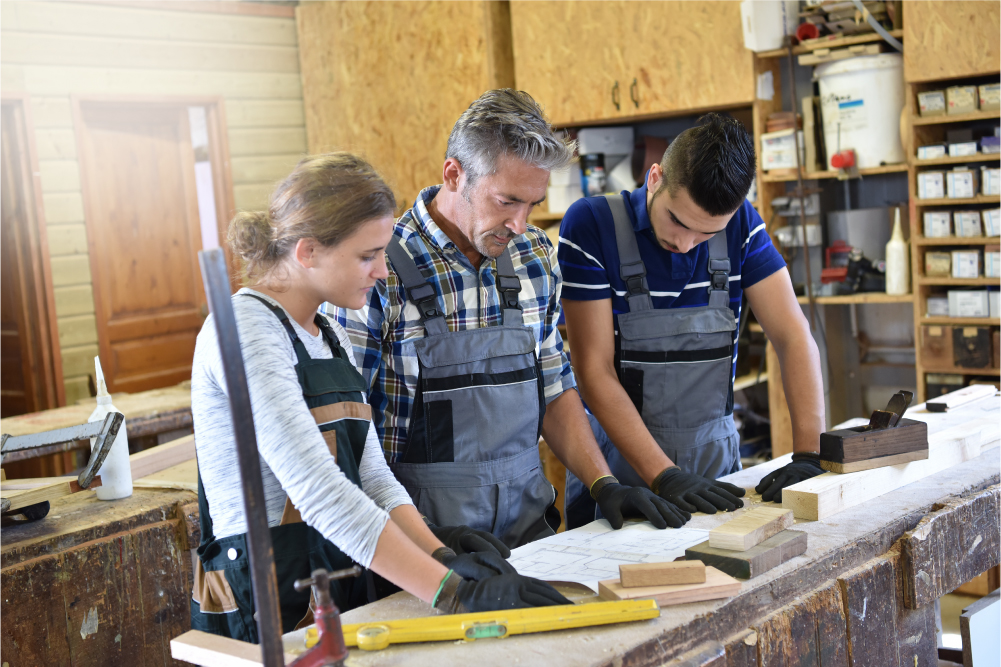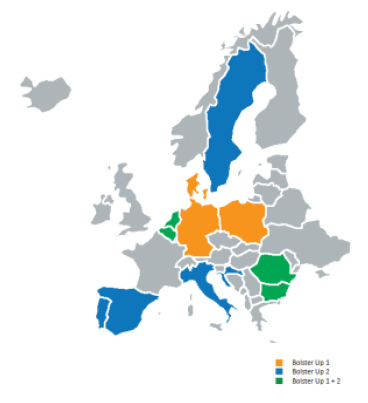Bolster-Up II
European Furniture Professions – Transparency for Upholstering, Cabinetmaking and Joining Qualifications and Quality in the EU Furniture Industry
Project aims
This project aims to contribute to the political goal of further fostering cooperation between national stakeholders at European level and supporting the need to modernize occupations and VET-structures.

The key idea is that the concept of European core professional profiles would work as a very good tool for guaranteeing minimum training standards, without the need of standardizing the different systems. These core profiles support the activities to raise the quality of existing national VET programs by contributing to mobility through recognition of the identified common core profiles within Europe.
The three professions are chosen as they represent the major group of the skilled handicraft workers in this sector. Most skilled handicraft workers are specialised in one material, e.g. wood, upholstery. Due to automation and robotization in the production of furniture, there are new challenges regarding job profiles, e.g. in terms of technical, more complex and higher skills as well as soft skills. The education and training systems have to take these changes into account, by updating occupational profiles and taking them on board in new curricula. Employees and enterprises of the sector are required to take part in lifelong learning to keep up-to-date and secure their employability.
As one outcome of the Bolster-Up II project, its report includes the description of the three core profiles for cabinetmaker, upholsterer and joiner, providing for each phase of the work a description of the knowledge, skills and competences required to perform tasks in the different countries.
Project methodology
The core profiles are based on extensive research of national qualifications as well as actual skills and competence requirements of the industry.
The results of the Bolster-Up I project as well as the Euro-joiner project are used as a basis to develop these core profiles. Additional needed information is collected through reports prepared by the partners at national level, but the sole use of these reports is not enough to extract the needed information for the definition of the core profiles. An analysis of the industry’s current and future competence requirements is necessary to develop the European core profiles. Therefore, questionnaires were prepared, focus groups and interviews were organized at national level with relevant stakeholders. We also refer to the DIGIT-FUR project and its reports.
Following the same methodology, the existing two profiles for cabinet maker and upholster (result of Bolster-Up I) is updated and adapted by the new countries / partners. The new profile for joiner is assessed by all the countries / partners.
The three core profiles are formulated in form of Learning Outcomes and sub-divided into LO units in order to be matched with the EQF level and respective NQF’s. Means and problems of assigning credits (ECVET) and potentially emerging sectoral frameworks are assessed. Gaining skills and competencies in non-formal and informal ways are analysed, potential validation discussed and results are shared among project partners. Sharing of national experiences was encouraged during project seminars (Brussels, Stockholm, Barcelona, Brussels, Porto and Milan).
Relevant actors of the social dialogue are involved in the project and there is a great interest from employers’ as well as employees’ side to implement long-term recognition of mutual European profiles in this sector.
The entire project, its implementation and outcome, is steered and supervised by a group of professionals, representatives of the European Social partners, of each country organizations, and the project coordinator.
The steering group and workgroup meetings have been properly organized. Websites of the project partners and their social media tools will also be used during the implementation of the project to inform about the different steps and activities organized and at the end to spread the results.

A short summary of the results will be drafted to this purpose. The Social Dialogue meetings will also be an important dissemination tool, during the project and at the end to ensure the sustainability and durability of the results and the efforts to foster wide recognition of the core profiles.
A number of newsletters were sent to the partners as a follow-up for the project.
The results of the project, which will be condensed in a booklet, will be translated in 7 languages in order to ensure a wider dissemination. A PDF version of the booklet will also be available for digital distribution.
